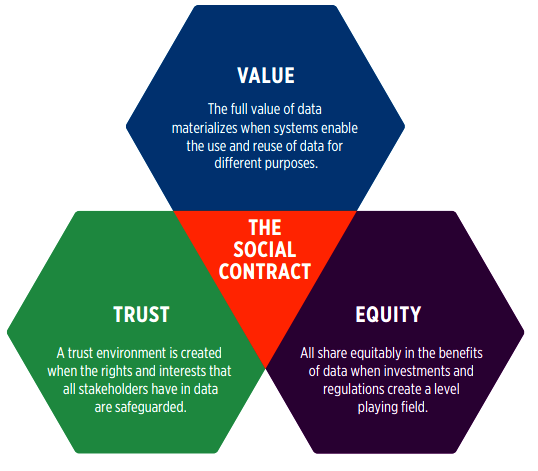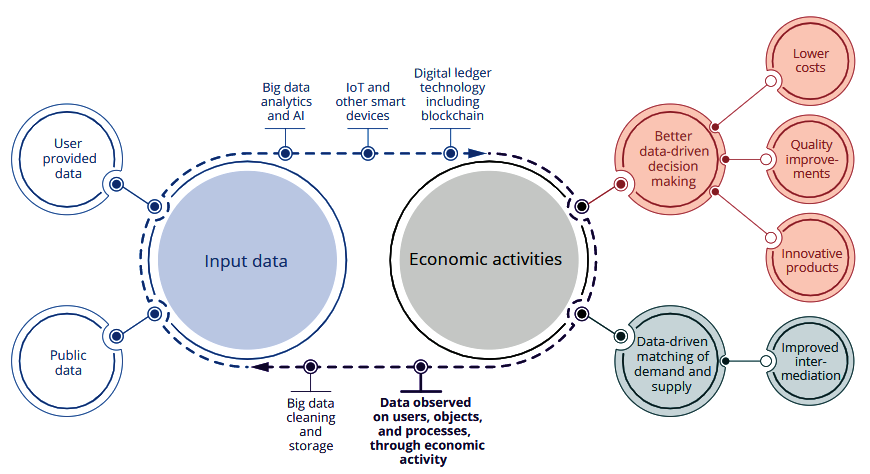Social Justice
World Development Report 2021: World Bank
- 27 Mar 2021
- 7 min read
Why in News
Recently, the World Bank has published the World Development Report 2021:Data for Better Lives.
- The World Development Report 2021 provides a blueprint on how to harness the power of data for development, to ensure no one is left behind.
Key Points
- The Social Contract For Data: To get more value out of data while protecting people against harm and ensuring access and representation. Different data-creating and data-using parties need to safely collaborate.

- The three elements of a social contract for data: Value, Equity and Trust
- Data As a Force For Public Good:
- Public intent data - data collected with the intent of serving the public good by informing the design, execution, monitoring, and evaluation of public programs and policies - are a prerequisite for many government functions.
- Public intent data can bring value to development through several pathways, such as
- holding governments accountable and empowering individuals,
- improving service delivery, and
- prioritizing scarce resources.
- Infinite Possibilities:
- Repurposing and integrating public- and private-intent data can help provide real-time and finer-scale insights, fill data gaps, and overcome limitations associated with each data type.
- Connecting The World: Data Infrastructure is a key part of ensuring equitable access to data for poor people and poor countries.
- Crossing Borders: Data is a tradable asset, but sending them across borders requires adequate data protection.
- Governing Data: The role of data governance is two fold:
- First, to control risks by ensuring the security, integrity, and protection of data and systems; and
- Second, to capture value by establishing rules and technical standards to enable data to be more effectively transferred, combined, and exchanged.
- Improving Data Systems: Fully harnessing the value of data requires building an Integrated National Data System (INDS).
- INDS is a way of countries realizing the potential of data for development, using the principles of the social contract as a blueprint.
- The INDS framework allows a country to share data between national participants safely while maximizing the benefit equitably.
- Issues Flagged by the Report:
- Not A Leveling Playing Field: An explosion of data platform businesses is raising concern about competition and posing new challenges for regulation.
- Data Platform: It is an integrated technology solution that allows data located in databases to be governed, accessed, and delivered to users, data applications, or other technologies for strategic business purposes.
- Lack of Open Data: Only 11% low-income countries make their data open (Not Accessible To General Public or research institution), the report flagged.
- The comparable rate for lower-middle-income countries was 19%, for upper-middle-income countries 22% and high-income countries 44%.
- Underinvestment In Public Intent Data Systems: Only half the countries had a national statistical plan that was fully funded as of 2019. While 93% of high-income countries had a fully funded national statistical plan, not a single low-income country had one.
- Issue Related To Lower-income Countries: Unable to harness the potential of data due to a lack of institutions, decision-making autonomy, and financial resources, all of which hold back their effective implementation and effectiveness of data systems and governance frameworks.
- Gaps In Data On Women And Girls are particularly severe: Only 10 of the 54 gender-specific indicators (19%) in the United Nations-mandated sustainable development goals (SDGs) were widely available.
- Misuse of Data: Making data accessible to more users and creating systems that facilitate their reuse also opens the door for data to be misused in ways that can harm individuals or development objectives.
- The report also flagged concerns over protection of personal data; misinformation; and attacks on software, networks and data systems.
- Data Infrastructural Gaps: There are major gaps evident between rich and poor people on broadband connectivity, and a substantial divide emerging between rich and poor countries when it comes to the availability of data infrastructure.
- Not A Leveling Playing Field: An explosion of data platform businesses is raising concern about competition and posing new challenges for regulation.
- Data Gaps In India:
- Echoed concerns on assessment of global poverty by the World Bank, which has been skewed due to absence of data on poverty from India.
- India monitors 54 out of the 130 SDG indicators. While the overall number of monitored indicators has gone up, the country has dropped four indicators from its tracking list.
- The report called for strategic repurposing of existing data.
- Some steps taken by India:
- National Data Sharing & Accessibility Policy (NDSAP):
- The National Policy is expected to increase the accessibility and easier sharing of non-sensitive data amongst the registered users and their availability for scientific, economic and social developmental purposes.
- Open Government Data (OGD) Platform:
- To provision an enabling Platform to provide proactive and open access to the data generated.
- To increase Transparency, Accountability, Citizen Engagement, Collaboration, Better Governance, Decision making & Innovation.
- Paradigm Shift in Governance – Direct Delivery of Services to Citizens, Setting up a Platform for Collaboration, Innovation in delivery of Services to Citizens.
- National Data Sharing & Accessibility Policy (NDSAP):
Way Forward
- Participation of the Poor: Data offers tremendous potential to create value by improving programs and policies, driving economies, and empowering citizens. The perspective of poor people has largely been absent from the global debate on data governance and urgently needs to be heard.
- International cooperation: The Report called for International cooperation to harmonise regulations and coordinate policies so that the value of data can be harnessed to benefit all, and to inform efforts toward a green, resilient and inclusive recovery.





